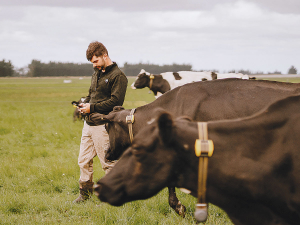Barry Flynn milks a 620-strong Friesian herd on 195ha in Methven, New Zealand.
The farm manager, originally from County Cavan in Ireland, is slowly building up numbers on the Cavendish Partnership Farm, an ex-forestry block just outside Mt Somers.
Three years out, and it presents some animal health challenges.
“We are building up the soil profile and the cows are producing lots of milk. The first year we hit our breeding target. But last year didn’t go our way,” says Flynn.
“This year, we wanted to explore how we could improve our breeding. One key strategy for doing that was collars.”
Flynn and farm owner Rob Turney decided to run with Tru-Test Automated Heat Monitoring with Active Collars from Datamars Livestock.
“From an Irish point of view, I am very aware of wearables,” Flynn says.
“Many farms back home would be using collars and the research behind this is extremely good.
“The way Rob and I thought about it was, ‘there was no point in fighting technology, it is coming in’.
“We might as well be innovative and understand it as early as we can to gain that couple of percent, which is key.”
Flynn claims the collars have been a great success.
“Our return rate at that first 21 days was extremely good.
“We have seen a very steady fall off in those numbers of cows coming back on heat which is a very good sign.
“ We can see from the data that we are inseminating them at the right time, not too early or late and the cows are holding on to the pregnancy.”
He claims the collar data has been a real help for younger animals.
“One weakness of the industry is that cows fall out of the system far too early, and we are not getting our cows back in calf as early as we should.
“The data from the collars is giving us every bit of health advantage. If we think of the cow as an athlete, we are asking a cow to calve down in August and demanding her to get back in calf by the first week in November.
“It is not giving the animal that much time to heal and recover. With these collars, we are doing our best to ensure as few cows are falling out of the system as possible. Going forward that’s our goal – sustainability."
All the cow behaviour data, and heat and health insights, are integrated through the Datamars Data Livestock Cloud Software. Flynn sees all this via the phone app.
“Rumination for example, the cow might physically look okay but inside its four stomachs might not actually be working 100%.”
She might be losing energy through that. It is quite easy then to say, that cow is not fully right. Especially over calving time, the data gives you the opportunity to be proactive. Those small things can make a huge difference to the whole impact of your season.”
“The other massive benefit with collars, as it is with every other industry, is staff. It’s a massive thing for us. This year has been hard, but we haven’t required someone on the vet stand. With collars you are saving a unit because you don’t need a second person in the shed. That makes a huge difference. I am saving two hours of everyday. Instead, I am outside making judgement calls, actually managing the farm which I am paid to do.”
Head of Datamars Livestock Smart Farming for Australasia Verne Atmore is pleased with the results farmers are seeing with their Active Collar Tag but is quick to point out it’s just the start.


















